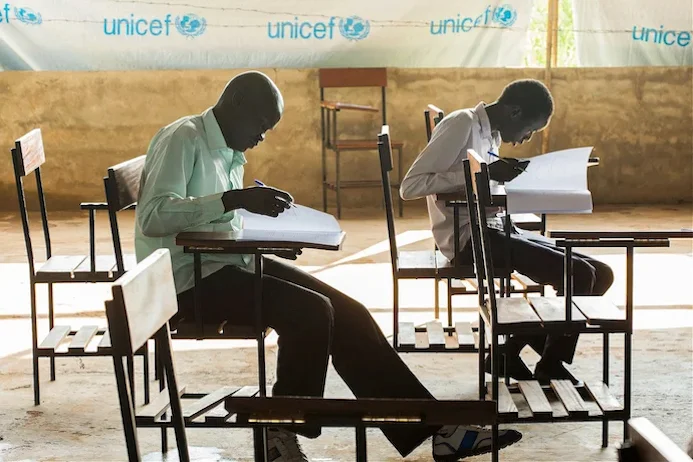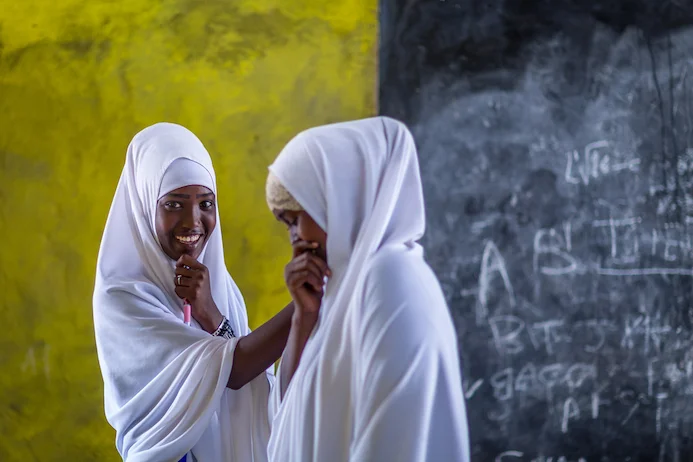The Platform
Latest Articles
by Mohamed Nouh Rakaab
by Shrey Madaan
by Sohail Mahmood
by Peter Marko Tase
by Shovkat Shamuratov
by Gordon Feller
by Manish Rai
by Mohammad Ibrahim Fheili
by Arees Khan Mangi
by Mohamed Nouh Rakaab
by Shrey Madaan
by Sohail Mahmood
by Peter Marko Tase
by Shovkat Shamuratov
by Gordon Feller
by Manish Rai
by Mohammad Ibrahim Fheili
by Arees Khan Mangi
How We can Safeguard Education Around the Globe
Domestic legal frameworks and policies are crucial to preventing and responding to rising attacks on education, ensuring accountability, and protecting vulnerable students in conflict zones.
The frequency, diversity, and severity of attacks on education are intensifying worldwide, yet accountability for these acts lags far behind. Responses often focus on the aftermath, addressing only the impacts of these attacks. To break this cycle of impunity, the solution must start with fortifying domestic legal frameworks and implementing effective policy measures that act as deterrents.
Education Above All Foundation (EAA), in collaboration with its partners, is actively working to provide technical assistance and support for national action plans aimed at reducing the occurrence of attacks on education and minimizing their damaging effects on children and youth.
The protection of education from such attacks has become a critical global priority due to the dramatic increase in violent armed conflicts, both in terms of scale and duration. According to the Global Coalition to Protect Education from Attack (GCPEA), approximately 6,000 incidents were reported targeting students, schools, universities, and educators. Between 2022 and 2023, the military use of schools and assaults on educators rose by nearly 20%.

Tragically, more than 10,000 students and teachers were killed, injured, abducted, or otherwise harmed during this period, with the majority of these incidents occurring in Palestine, Ukraine, the Democratic Republic of the Congo, Myanmar, India, Pakistan, and Afghanistan.
Each context where these attacks occur presents unique challenges that require tailored responses. Effective strategies must address the underlying reasons behind these attacks and their impacts, focusing on protecting the educational future of children and youth. Robust domestic legal frameworks and national policies are essential starting points for discussions on preventing, mitigating, and ensuring accountability for attacks on education, especially in regions where these incidents are prevalent.
The Role of Domestic Legal Frameworks
Domestic legal frameworks play a central role in safeguarding educational institutions, students, and teachers from violence. These frameworks often complement or are distinct from protections already enshrined in international law and human rights treaties. Despite these international obligations, domestic legal systems frequently fail to specifically criminalize attacks on education, even though they may generally prohibit violence or the use of force. Additionally, national education policies often overlook the issue of attacks on educational institutions and fail to allocate resources for protecting students, educators, and schools.
This gap leaves much of the responsibility for responding to attacks on education to the legal and security sectors, with little attention to preventive measures. However, effective domestic laws and policies that criminalize such attacks could significantly bolster the deterrence of these crimes and help bring perpetrators to justice. By targeting specific acts, legal frameworks serve as crucial tools for holding aggressors accountable, reinforcing the seriousness of these offenses, and upholding the rule of law in conflict-affected settings.
For instance, Colombia has demonstrated a positive approach by adopting the Safe Schools Declaration. This commitment has led to substantial legal reforms, including criminalizing the use of schools for military purposes and reducing the likelihood of educational institutions being targeted during conflicts.
In 2024, following consultations with government officials and other key stakeholders, EAA conducted technical analyses of existing legal and policy frameworks to assess the protection of education in specific countries. This work has been bolstered by wide-ranging consultations with ministries, civil society organizations, and international bodies to identify gaps and propose improvements to legal and policy frameworks. By addressing these gaps, EAA seeks to prevent the recurrence of attacks on education and create mechanisms to deter potential aggressors.

The Importance of Accountability
Strengthening domestic accountability is critical, and international oversight mechanisms are essential. In Afghanistan, the introduction of laws specifically designed to protect education has been linked to a reduction in targeted attacks on schools. The country has also developed monitoring systems that track and report on attacks in collaboration with international organizations, thus improving accountability and deterring potential aggressors.
EAA has played a pivotal role in enhancing these global accountability efforts. For example, in partnership with KoBo Toolbox, EAA has developed the TRACE Data Portal, which tracks the occurrence, frequency, typology, and perpetrators responsible for attacks on education worldwide. This data is instrumental in understanding the nature and motivations behind such attacks and will aid in creating more effective legal frameworks for protection and deterrence.
Translating Legal Protections into Effective Policies
While strong legal frameworks are essential, they must be supported by well-crafted policies that translate legal obligations into actionable measures. Effective policies ensure adequate resources for school security, training for educators, and support services for students affected by conflict.
An example of this can be seen in Nigeria, where the government adopted the Safe Schools Initiative in response to the Boko Haram abduction of schoolgirls in Chibok. This initiative, supported by national and international legal frameworks, has led to the deployment of security personnel to vulnerable schools and the construction of protective infrastructure, enhancing safety for students and educators.
Legal protections and policies are especially crucial for safeguarding the rights of vulnerable groups, including girls, refugees, minorities, and children with disabilities, who are often disproportionately affected by conflicts. In such contexts, legal frameworks ensure that these groups’ right to education is protected, while policies promoting safe, inclusive learning environments help maintain school attendance and reduce dropout rates, even in areas with heightened security risks.
EAA has made significant strides in ensuring that vulnerable children, especially those living in conflict zones, continue to have access to education. In Gaza, for example, EAA’s legal advocacy has helped establish safe learning environments despite ongoing violence. EAA’s initiatives illustrate how legal frameworks can secure education rights, even in the most challenging circumstances.
Global Commitments and Post-Conflict Recovery
Internationally, the Safe Schools Declaration has become a pivotal document in the fight to protect education in conflict zones. Endorsed by over 118 countries and supported by EAA and GCPEA, this international commitment has driven the development of domestic legal reforms and policies aimed at preventing the targeting of schools, students, and educators during conflicts. This collaborative effort has raised global standards for the protection of education and reinforced international commitments to safeguarding it.
In post-conflict settings, legal frameworks guide the recovery and rebuilding of educational systems. These frameworks ensure that reconstruction efforts prioritize the protection of schools and address the needs of communities devastated by conflict. Furthermore, they provide for reparations for victims of attacks on education and help restore trust in educational institutions.
In Somalia, EAA has played an integral role in rebuilding the education system following years of conflict. It has helped restore schools, train teachers, and develop policies safeguarding students and teachers from future attacks. This work has been crucial in restoring education as a cornerstone of peace and stability in the region.
A Global Call to Action
Each year, on September 9th, EAA marks the International Day to Protect Education from Attack (IDPEA). Established by the United Nations in 2020 through Resolution 74/275, the IDPEA was spearheaded by the State of Qatar, with EAA’s founder, Her Highness Sheikha Moza bint Nasser, playing a prominent role in the campaign. The IDPEA is a powerful reminder of the international community’s responsibility to safeguard education and reinforces the need for legal and policy reforms to protect it, particularly in conflict zones.
This day serves as a call to action, bringing together experts, policymakers, and educators to share best practices and explore innovative approaches to protect education in conflict-affected areas. In an era where attacks on education are increasingly frequent and severe, it is critical to reinforce our legal and policy frameworks to ensure that education remains accessible, even in the world’s most dangerous regions.
Siraj Khan is a Law and Policy Manager at the Education Above All Foundation.